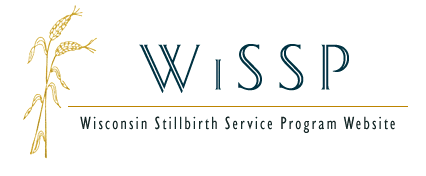The Wisconsin Stillbirth Service Program (WiSSP) was developed to provide families and health professionals of Wisconsin with comprehensive services for the evaluation of stillborn infants. Lack of such a program left few stillborns adequately assessed, thus leaving medical providers and counselors at a loss to answer grieving parents' most consuming questions, "Why did this happen?" and "Will this happen again?" It was in this context that WiSSP was established.
Since 1983, WiSSP has provided a statewide service to families and the medical care providers who help them. By educating personnel of birth hospitals of the need for thorough stillbirth assessment and generating specific protocols for this etiologic investigation, WiSSP has attempted to overcome obstacles which have impeded adequate assessments of stillborns in the past. Community birthing hospitals carry out all evaluations of stillborn infants and WiSSP provides diagnostic interpretation of the generated data.
WiSSP was founded by Richard M. Pauli, MD, PhD, a nationally recognized expert in stillbirth assessment and related fields who also served as director from 1983 through 2009. His commitment to WiSSP was both professional and personal, as he is also the father of Zachary Abraham, stillborn June 4, 1979. After Dr. Pauli's retirement, Dr. Elizabeth McPherson led WiSSP. Dr. McPherson, like Dr. Pauli, is a medical geneticist with many years of interest and experience in evaluating stillbirth infants.
In 2018, Dr. Kristen Sharp assumed leadership of WiSSP. Dr. Sharp is a clinical associate professor in the Department of Obstetrics and Gynecology at the University of Wisconsin-Madison.
Through WiSSP's efforts, nearly 3000 infants have been referred for interpretation of diagnostic evaluation. A current study looked at 416 WiSSP referrals from a recent five-year span (2004-2010): in 70% of these cases a cause sufficient to independently explain the fetal death was found; in 95% of the cases at least one casual or contributing anomaly was recognized (VanderWielen et al., 2011). This data confirms that assessments of stillborn infants are useful and often will provide parents with information that may help them in their time of grief.
WiSSP's activities have expanded since its beginnings. WiSSP maintains an archived library of WiSSPers, a quarterly newsletter for health professionals. Although current funding does not permit regular publication of the newsletter, past issues available on this site contain important information that does not go out of date. With establishment of this website, WiSSP can now share with a larger audience the contributions it has made to the service of parents who experience stillbirth and the professionals who care for them.

